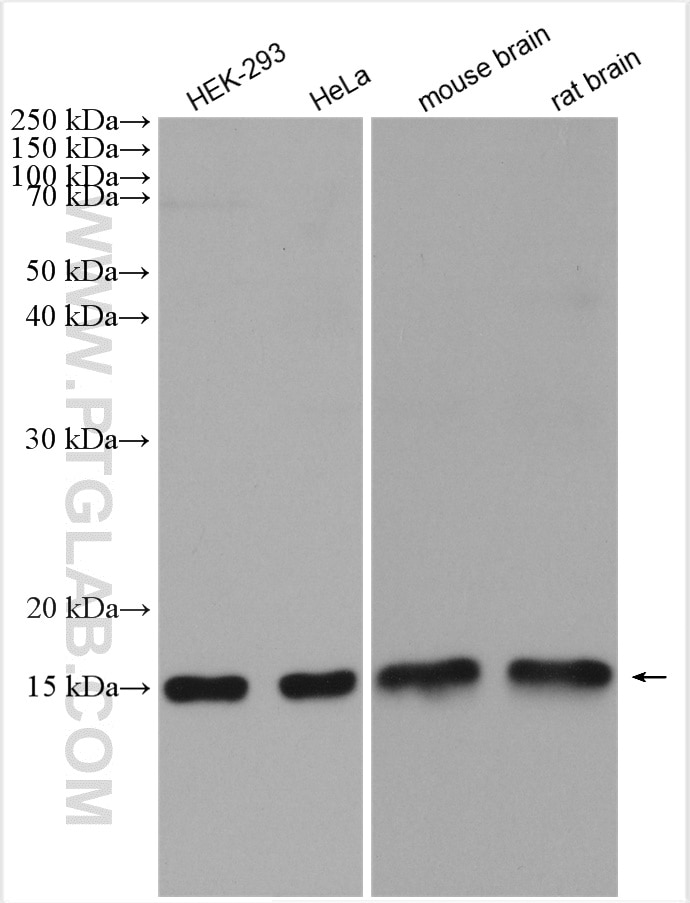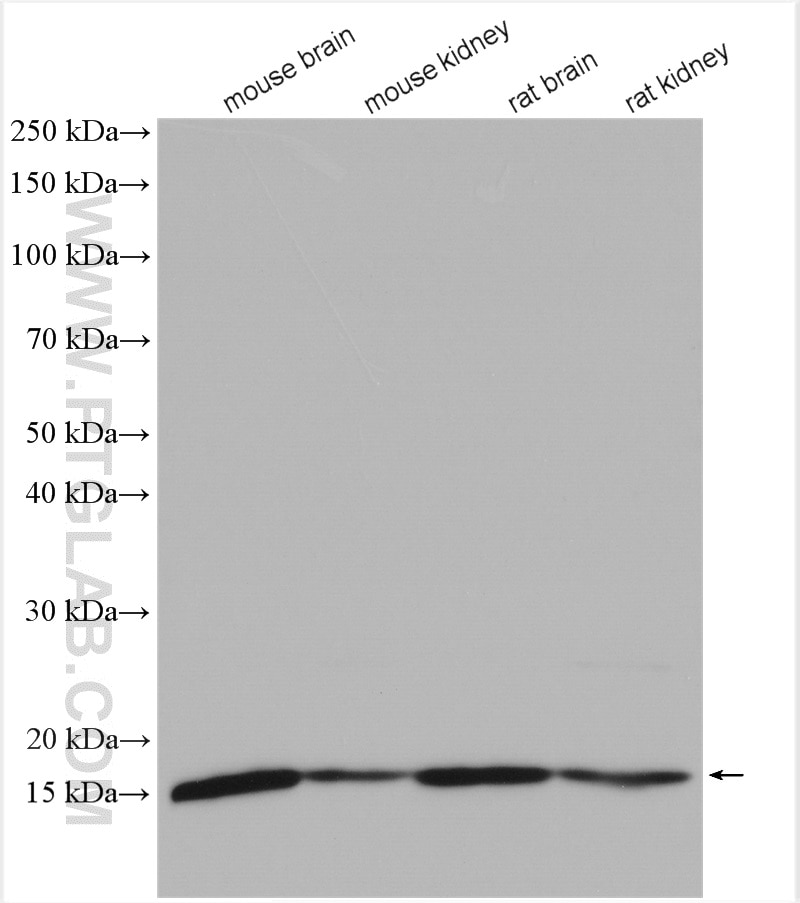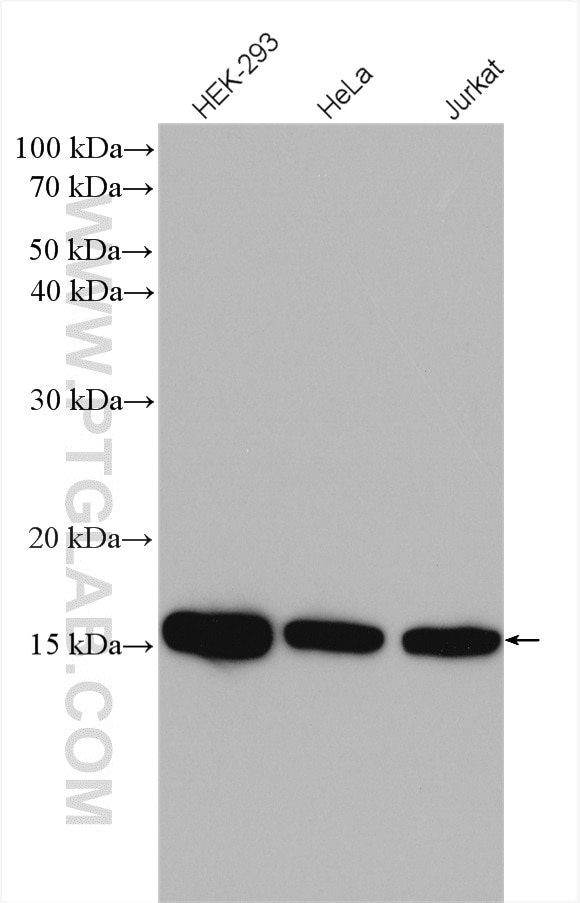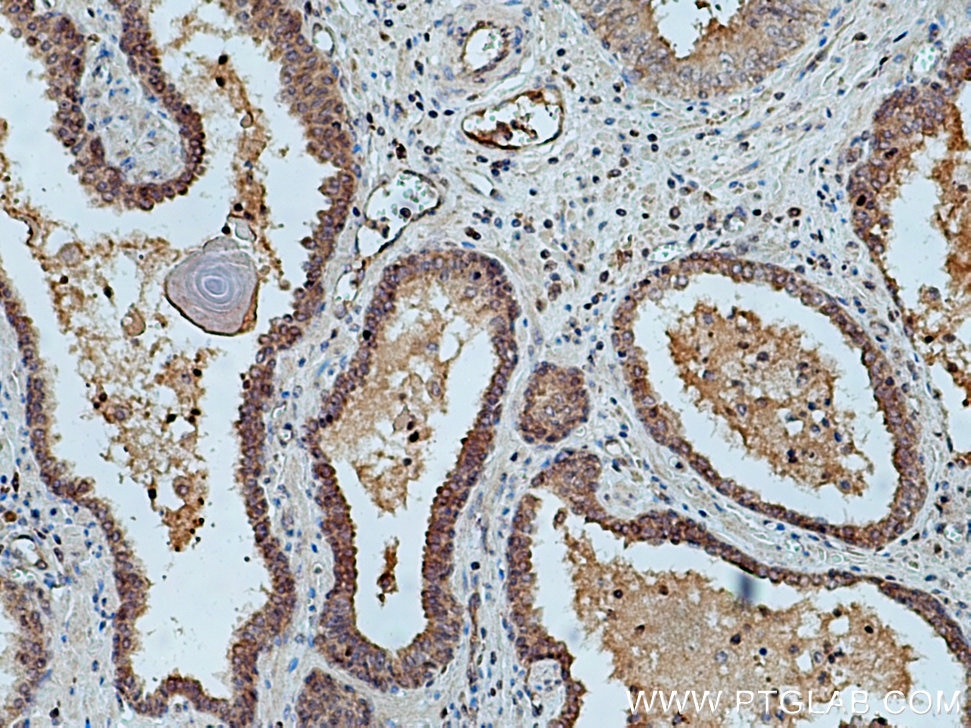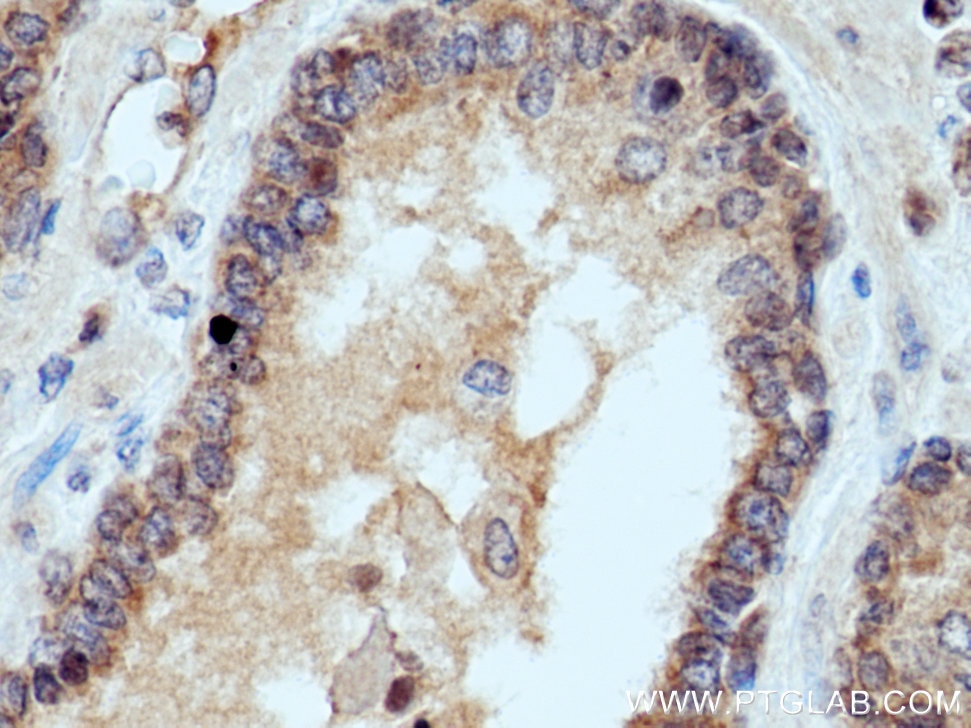UBE2D1/2/3/4 Polyklonaler Antikörper
UBE2D1/2/3/4 Polyklonal Antikörper für WB, IHC, ELISA
Wirt / Isotyp
Kaninchen / IgG
Getestete Reaktivität
human, Maus, Ratte und mehr (1)
Anwendung
WB, IHC, ELISA
Konjugation
Unkonjugiert
Kat-Nr. : 11677-1-AP
Synonyme
Geprüfte Anwendungen
| Erfolgreiche Detektion in WB | HEK-293-Zellen, HeLa-Zellen, Jurkat-Zellen, Maushirngewebe, Mausnierengewebe, Rattenhirngewebe, Rattennierengewebe |
| Erfolgreiche Detektion in IHC | humanes Prostatakarzinomgewebe Hinweis: Antigendemaskierung mit TE-Puffer pH 9,0 empfohlen. (*) Wahlweise kann die Antigendemaskierung auch mit Citratpuffer pH 6,0 erfolgen. |
Empfohlene Verdünnung
| Anwendung | Verdünnung |
|---|---|
| Western Blot (WB) | WB : 1:1000-1:4000 |
| Immunhistochemie (IHC) | IHC : 1:500-1:3000 |
| It is recommended that this reagent should be titrated in each testing system to obtain optimal results. | |
| Sample-dependent, check data in validation data gallery | |
Veröffentlichte Anwendungen
| KD/KO | See 1 publications below |
| WB | See 9 publications below |
| IHC | See 3 publications below |
Produktinformation
11677-1-AP bindet in WB, IHC, ELISA UBE2D1/2/3/4 und zeigt Reaktivität mit human, Maus, Ratten
| Getestete Reaktivität | human, Maus, Ratte |
| In Publikationen genannte Reaktivität | human, hamster, Maus |
| Wirt / Isotyp | Kaninchen / IgG |
| Klonalität | Polyklonal |
| Typ | Antikörper |
| Immunogen | UBE2D1/2/3/4 fusion protein Ag2278 |
| Vollständiger Name | ubiquitin-conjugating enzyme E2D 3 (UBC4/5 homolog, yeast) |
| Berechnetes Molekulargewicht | 17 kDa |
| Beobachtetes Molekulargewicht | 17 kDa |
| GenBank-Zugangsnummer | BC003395 |
| Gene symbol | UBE2D3 |
| Gene ID (NCBI) | 7323 |
| Konjugation | Unkonjugiert |
| Form | Liquid |
| Reinigungsmethode | Antigen-Affinitätsreinigung |
| Lagerungspuffer | PBS with 0.02% sodium azide and 50% glycerol |
| Lagerungsbedingungen | Bei -20°C lagern. Nach dem Versand ein Jahr lang stabil Aliquotieren ist bei -20oC Lagerung nicht notwendig. 20ul Größen enthalten 0,1% BSA. |
Hintergrundinformationen
Ubiquitination is a post-translational modification pathway or is part of the specific protein-degradation pathway by the 26S proteasome. Ubiquitination of a target protein involves multistep enzymatic reaction catalyzed by a cascade of enzymes including Ub-activating enzymes (E1s), Ub-conjugating enzymes (E2s) and Ub ligases (E3s) (PMID: 23542885). UBE2D family, which has 4 members named as UBE2D1/2/3/4, is an E2 ubiquitin-conjugating enzyme family in the ubiquitin-proteasome system. This antibody can recognize all the four members of UBE2D due to the high homology.
Protokolle
| PRODUKTSPEZIFISCHE PROTOKOLLE | |
|---|---|
| WB protocol for UBE2D1/2/3/4 antibody 11677-1-AP | Protokoll herunterladen |
| IHC protocol for UBE2D1/2/3/4 antibody 11677-1-AP | Protokoll herunterladenl |
| STANDARD-PROTOKOLLE | |
|---|---|
| Klicken Sie hier, um unsere Standardprotokolle anzuzeigen |
Publikationen
| Species | Application | Title |
|---|---|---|
Nat Commun Clr4SUV39H1 ubiquitination and non-coding RNA mediate transcriptional silencing of heterochromatin via Swi6 phase separation | ||
Sci Signal Proteome-wide mapping of the Drosophila acetylome demonstrates a high degree of conservation of lysine acetylation. | ||
Oncotarget UBE2D3 gene overexpression increases radiosensitivity of EC109 esophageal cancer cells in vitro and in vivo. | ||
Am J Cancer Res The E3 ubiquitin ligase RBCK1 promotes the invasion and metastasis of hepatocellular carcinoma by destroying the PPARγ/PGC1α complex. | ||
Front Oncol UBE2D3 Activates SHP-2 Ubiquitination to Promote Glycolysis and Proliferation of Glioma via Regulating STAT3 Signaling Pathway. | ||
Oncol Lett UBE2D3 is a positive prognostic factor and is negatively correlated with hTERT expression in esophageal cancer. |
